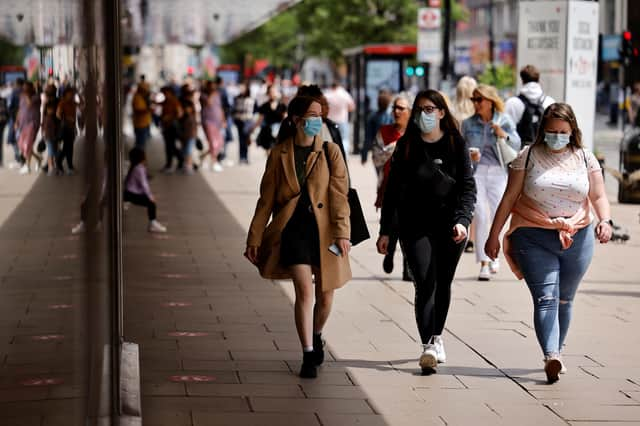Ofcom’s mission creep is a threat to our liberty and more - Brian Monteith


Then there are those who suffered economically or saw their education ruined or their jobs lost – and the ramifications are not over yet.
I wager, however, few realise just how much our freedoms to question, criticise and simply speak out have also been curtailed. The sheer scale of the public’s manipulation by all our various governments and their hydra-like agencies has been too much for most people to comprehend – and who can blame them when their first instinct is to protect themselves, and their families?
Advertisement
Hide AdAdvertisement
Hide AdSadly, I write this column to warn the darker side of the global Covid response by western society is likely to get far worse, that it will be especially bad across Britain, and that most people will remain unaware until they are confronted directly with the latest restrictions being introduced.
When the lockdown started back in March last year the UK Government gave The Office for Communications (Ofcom) – its agency responsible for regulating TV, radio, video on demand sectors, fixed line and mobile telecoms, postal services and the airwaves which wireless services operate – new powers to monitor and penalise unhelpful reporting of the pandemic by those under its purview. By law the ability of broadcasters news and current affairs programmes to report competing views around what the coronavirus pandemic actually was and how it might develop became government controlled.
Essentially, once the co-ordinated response of government, most notably through COBRA meetings and ministers taking advice from advisers and their committees such as SAGE was agreed, that particular narrative became gospel and its contradiction risked huge fines and ultimately imprisonment.
An early example was the political consensus saying facemasks were of no practical use as a line of defence against contracting or spreading Covid-19 and could even be harmful by encouraging bacterial infection and damaging mental health. Then, without any scientific evidence but actually to heighten the sense of fear, our politicians changed their minds and ruled facemasks should be mandatory for indoor public places with only a few exceptions. As a result that revised consensus became the new testament Ofcom had to police, meaning broadcasters immediately dropped any criticism of the effectiveness or need for facemasks.
The need for facemasks; the need for and actual length required for social distancing; the veracity of Covid statistics that moved like jumpers for goalposts; the efficacy of the tests, and many other aspects of what we were being told were simply not up for debate on our TV and radio. The debates around the veracity of death rates and differences between death “with” or “from” Covid were also suppressed; “Death with Covid” became the standard term of use, as the far lower figures of “from” might mean public complacency and shatter the government’s Covid response strategy of using its very own project fear.
As a result such topics were also marginalised in our newspapers – for in reporting policy changes newsprint often gives priority to the news agenda set by broadcasters – and commercial operations also had to take account of government emergency advertising support becoming a sword of Damocles. Only in opinion columns, such as this, and correspondence from readers would sceptical voices be found.
Social media, such as blogs, websites and Tweets offered some hope of free expression but soon it was found they too were being policed by Facebook, Google and Twitter, to name but a few of such providers. I had my own experience of facing restrictions from Facebook and I know of many others – including esteemed and highly reputable professors being marginalised or banned altogether.
The long arm of Ofcom became even stronger in the debate about what constitutes a vaccine (now redefined to accommodate the Covid vaccines) and whether or not under-50s or even teenagers should have them to the desirability of enforcing passports. Reporting of negative reactions and deaths have, unsurprisingly, been limited generally to newspapers or private social media channels except when other countries raised concerns where Ofcom’s writ could not run.
Advertisement
Hide AdAdvertisement
Hide AdAs Laura Dodsworth’s book, A State of Fear, explains Ofcom’s role has been effective, but now the UK Government intends to give it more powers so it can now monitor and restrict digital media directly, effectively closing down free speech on the internet it does not like.
If such powers become regular and normalised rather than exceptional (and look how squashing the sombrero to save the NHS became a semi-permanent lockdown and its unravelling is still being resisted) – then what happens if those powers are applied under some “emergency” to other governments priorities?
Also our government, with Google and others, has funded new media tools to stamp out critical comment worldwide and given them to the heavily CCP-controlled World Health Organisation to use.
It matters not if you are politically left or right, Leave or Rejoin, unionist or nationalist – the administering of such powers for one government over one issue can easily allow a different government over different issues to use precedent to repeat or widen this suffocating embrace.
All delivered by a faceless agency that ministers can park any blame with but never be held accountable for.
Ofcom’s mission creep should be pruned back or this pervasive poison ivy will be terminally painfully to our prized liberty.
Brian Monteith is editor of ThinkScotland.org and served in the Scottish and European Parliaments for the Conservative and Brexit Parties respectively.
